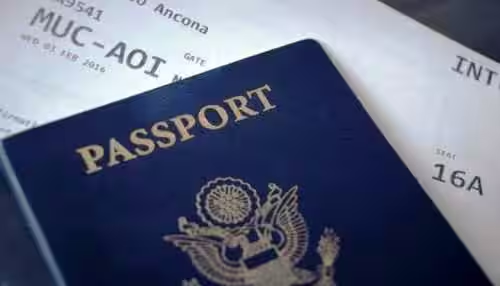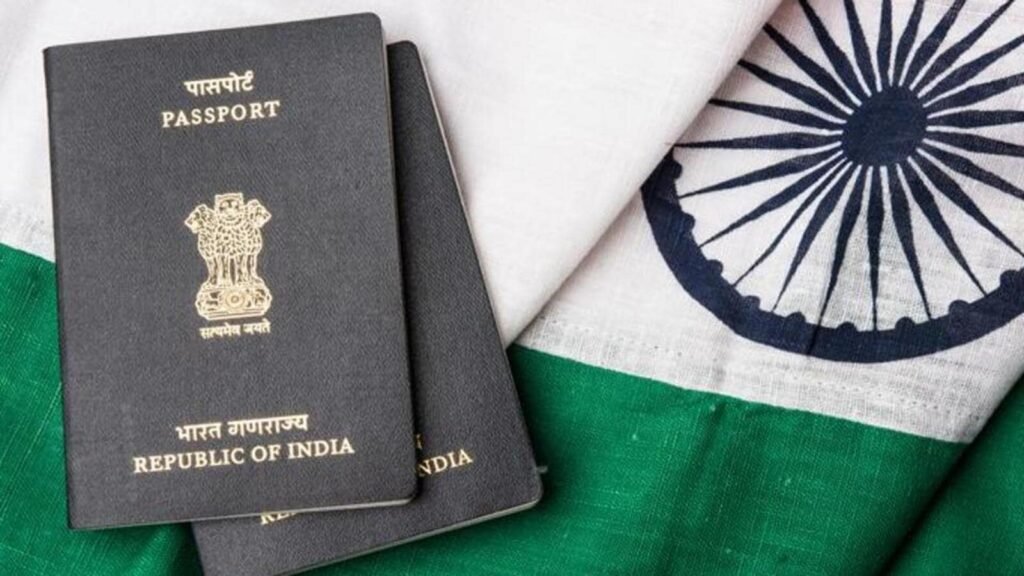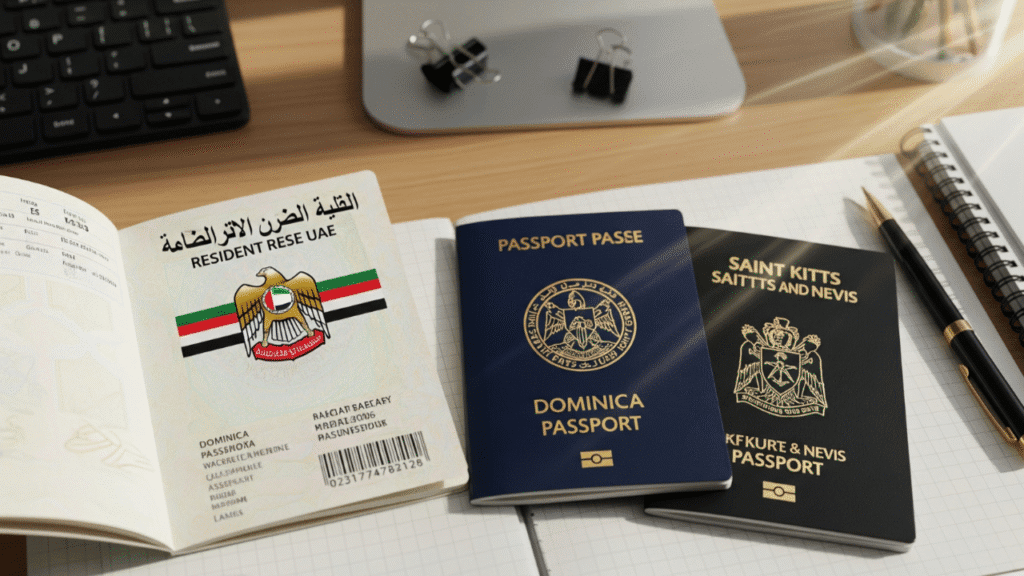In a land built on ambition and reinvention, the UAE has long attracted Indians seeking not just better opportunities, but a complete lifestyle upgrade. For many, this meant not only moving to the Gulf but also securing a powerful passport that opened the doors to seamless global travel, business advantages, and elite privileges.
But today, that carefully curated dream is being disrupted — and the very passports they bought for freedom are now being treated as liabilities.
The Rise of the ‘Second Passport’ Trend
Over the past decade, wealthy Indian expatriates in the UAE, especially business owners, real estate investors, and high-net-worth individuals, quietly joined a growing global trend: acquiring second citizenships through investment. From the sunny Caribbean islands to European enclaves, these citizenship-by-investment programs promised visa-free travel to countries like the UK, EU, and Canada.

In a region where the Indian passport limits travel freedom, many saw this as a smart move. Golden Visa programs and citizenship-for-sale schemes were advertised with the promise of “Plan B” security, financial mobility, and the priceless ability to move families and businesses internationally without restrictions.
Countries like St. Kitts and Nevis, Grenada, Dominica, and Vanuatu became unlikely household names among Dubai’s Indian elite. Some even took it further, applying for Cypriot, Maltese, or Portuguese citizenship, investing hefty sums into properties or development projects just to earn those coveted travel documents.

Giving Up Their Indian Citizenship
For those chasing these new passports, the cost wasn’t just financial — it came with the heavy decision of renouncing their Indian citizenship. India, unlike some countries, doesn’t permit dual citizenship. So once approved for their new nationality, these individuals had to surrender their Indian passports.
It was an emotional decision for many. Being Indian isn’t just a legal status — it’s tied to identity, culture, and family roots. But in the cosmopolitan swirl of the UAE, with its tax benefits and borderless business world, the trade-off seemed worthwhile at the time.
For a while, the plan worked. With their new Caribbean or European passports, travel to Schengen states, the UK, and North America was smooth, visa-free, and hassle-free. International deals could be negotiated over weekend getaways in London, family holidays happened without months of paperwork, and emergency travel during crises was easier than ever.
The West’s Sudden Clampdown
But in 2024 and into 2025, tides began to turn.
Amid rising concerns over security, economic migration, and the integrity of citizenship-by-investment schemes, Western countries started tightening their entry rules. The UK, Canada, and several EU nations quietly revised visa-waiver agreements with countries offering ‘passports-for-sale.’ The result? Citizens from several of these nations — including those holding second passports from Caribbean and island nations — now find themselves needing visas again, with longer, stricter application processes.
For many Indians in the UAE who gave up their Indian passports to acquire these alternative citizenships, this has become a rude awakening.
Suddenly, individuals who once traveled visa-free to London or Paris now find themselves queuing at embassies, scrambling for paperwork, and facing rejections or months-long delays. The freedom they paid for, sometimes in the range of $150,000 to $2 million depending on the country, vanished overnight.

Emotional And Financial Fallout
The emotional fallout has been significant. Many Indian expatriates, already separated from their homeland and extended families, now feel even more isolated as their travel privileges erode.
For 43-year-old Ashwin (name changed), a Dubai-based real estate investor, this change has turned life upside down.
“I gave up my Indian citizenship to get a St. Kitts passport so I could travel freely and set up a business base in Europe. Now, I can’t even get a visa to Canada, and my UK visa application was rejected last month. If I had known this was coming, I would never have done it,” he shares.
The financial losses are no less painful. Some who invested in overseas property or business ventures solely to acquire these second passports now find themselves stuck with illiquid assets in distant countries where they have no ties, no family, and dwindling returns.
There’s also the irony that many of these individuals still hold Indian roots at heart, visiting family during festivals or managing ancestral properties — something now made more complicated since India treats foreign nationals differently in terms of property rights, investments, and taxation.
Legal Complications And Hurdles
Besides emotional and financial woes, legal complications have surfaced. Many of these new passport holders had businesses registered under their Indian identity or travel histories linked to their old Indian passports. Now, discrepancies between documents, names, and nationalities have begun raising questions in legal and financial institutions globally.
Moreover, as new nations like the US, UK, and Australia revise their vetting of citizenship-by-investment passports, additional security checks and delays have become the new norm.
For those seeking to apply for residency or work permits abroad, their new citizenship is no longer considered a straightforward credential but a risk factor. Financial transactions, property acquisitions, and even schooling for children overseas now involve extra scrutiny.
The Future Of The Second Passport Market In UAE
The buzz around second passports among UAE’s Indian community has dulled significantly in recent months. Immigration consultants, once aggressively promoting these schemes through glossy brochures and hotel ballroom events, now find it harder to close deals.
Potential applicants are increasingly cautious, demanding guarantees that no such visa bans or restrictions will be imposed in the future — something no country or agent can truly promise.
Some governments, like Portugal and Greece, have already tightened their residency-by-investment programs, while Caribbean nations face mounting international pressure to reform or shut down their citizenship sales altogether.
Meanwhile, some Indians are exploring alternative options — like long-term UAE Golden Visas or securing permanent residencies in countries with more stable immigration policies. Others are considering retaining Overseas Citizen of India (OCI) cards to preserve travel rights and property privileges in India, even while holding another nationality.
A Hard Lesson In Global Mobility
For those who took the leap, the unfolding situation is a sobering reminder of how fragile global mobility can be. What seemed like a smart investment a few years ago is now a cautionary tale.
“I thought I was buying freedom,” admits Ramesh, a Dubai-based entrepreneur. “But it turns out freedom is never for sale. Governments can change their rules whenever they like. Now I’m stuck between countries — not fully accepted anywhere.”
His sentiment echoes across the Indian diaspora in the Gulf, where stories of sudden visa bans and immigration hurdles have become common WhatsApp forwards and dinner table conversations.

Identity And Belonging Beyond Borders
Beyond the practical setbacks, the episode has also reignited conversations about identity, belonging, and the meaning of nationality in a globalised world.
Many Indians in the UAE say they now feel like citizens of nowhere — having left India, unable to fully integrate into Emirati society, and now facing doors closing in the West.
It’s a complex, layered dilemma. For decades, passports were seen as the ultimate symbol of power, privilege, and possibility. But recent events have shown that no matter how much money one pays, certain freedoms remain vulnerable to shifting geopolitics.
Some, like 38-year-old Mira, a PR consultant in Abu Dhabi, have chosen to see this as an opportunity for reflection.
“It’s made me rethink what truly matters. Maybe it’s not about which passport you hold, but where you find peace, security, and community. No piece of paper can give you that,” she reflects.
The New Approach: Stability Over Status
Moving forward, financial advisors and immigration experts are advising UAE-based Indians to focus on stability and long-term security rather than chasing passport status symbols.
Golden Visa programs, permanent residencies, and legal pathways that allow for dual-structured financial planning without renouncing Indian citizenship are being explored as safer, more reliable options.
For a generation of Indian expatriates who once viewed second passports as the ultimate success accessory, this chapter serves as a reminder that in an unpredictable world, roots often matter more than routes.
Follow us on Instagram: UAE STORIES
Dubai Sets RWA Milestone With First Approval of Tokenized Money Market Fund













